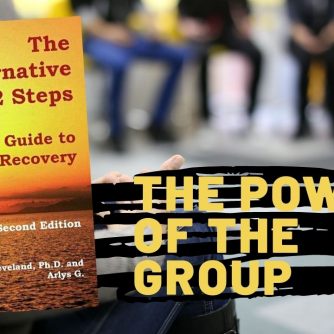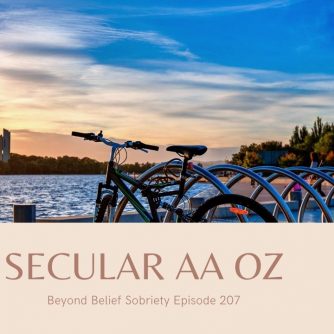In today’s podcast, we meet Andrew A. from Oklahoma City, Oklahoma who discusses his experience with starting a secular AA meeting in the very buckle of America’s Bible Belt. What follows is an essay that Andrew was kind enough to write and submit for inclusion with this podcast.
Secular AA In the Buckle of the Bible Belt
By Andrew A.
I had over 3 years of sobriety in 2010 when I found a doctor who was more than happy to relieve my pain from a failed relationship with a prescription for pills. Then, to get off those pills, I was prescribed more pills, but neither set of pills lead me back to sobriety.
While traveling to Colorado on business in January 2014, I decided to have some “legal” fun and quickly discovered that smoking pot as an escape could be pursued to the same extent as my drinking, and by late February 2014, I was ending every night blacked out in rooms polluted with marijuana smoke. I became scared. Although I had successfully given up 100 proof Tvarscki since December 22nd, 2006, I was essentially back there again, unable to stop, unable to slow down, unable to share my fear.
Then on March 7th, 2014, I managed to stay clean, and at 8:01 the following morning, I was in my car outside my home group, The May Club in Oklahoma City. Having just attended the 7:00 am meeting, I was one mile from my home where the drugs were waiting. I knew I had a limited window of time to reach out to any of the more than 50 phone numbers of AA men stored in my phone, so I created a group text to several of them, typing, “I need help.” After no response by 8:03 am, I thought that maybe nobody wanted to help me with a flat tire at that time in the morning, so I sent a second text.
This is Andrew. I have been taking pills and smoking pot and I need help.
In less than a minute the first reply came from Steve Z., and I knew it was over. People now knew, and I was safe again. I was no longer alone—again.
That first year of new sobriety differed from my initial walk with AA in 2007. I came out openly as an atheist and found that I was, for the most part, met with love. Being entirely honest had a fresh meaning for me, and I knew that I could no longer simply speak the lingo of AA, or translate my thoughts into spiritual language that others would accept. I was a sober atheist, and there was a beauty in my understanding of my sober life without a god that I needed to share. At times I got angry, but the anger fueled a desire to find concrete reasons for how and why the 12 Steps worked for me the first time around.
I knew there was a tangible explanation for the benefits of prayer, and I knew the explanation wasn’t an entity outside myself granting wishes. So, during that first year, I read anything and everything I could find about secular recovery and scientific studies of addiction and recovery.
Studies such as the “Molecular Neurobiology of Addiction Recovery” taught me why the AA program works at a molecular level. Over time, I learned how to incorporate that knowledge into my sharing at meetings to help others like myself who wanted to know why and how the 12 Steps help people obtain sobriety. Early, during that first year, I shared poorly because I was too focused on my freedom from religion and less focused on transmitting the solution. However, I paid attention to myself and to people’s reactions.
I also dove into AA literature to understand why Bill Wilson had excluded Atheists, and I discovered that he had not done so purposefully. In Bill’s early writings, I saw that he had no understanding of us, and even his later writings still showed a lack of conception about life without any belief in gods. It helped me to fully understand the Christian roots of AA, and why Bill was unable to reach out to Atheists, and why the Chapter, “We Agnostics” is more likely to push atheists out the door than encourage them to stay. Everything I learned brought me closer to AA, and more comfortable in that AA was my home where I would learn to live a sober life. I was happy that I never left.
Throughout this time while I was learning and sharing openly, my real friends drew closer while my acquaintances showed their true colors. In fact, some people who I considered friends became angry with me, sometimes openly so, but even that helped to solidify my path of secular sobriety within AA.
What I discovered was a real solution through a fundamentally religious program, and I learned why belief is such a powerful tool for so many. Though I was once hostile toward religion, I now embraced a softness toward the people who believed they were in a relationship with their god. I knew why that worked for them, and why it could not work for me, but I also saw how we walked nearly identical paths when it came to our actions with taking the Steps.
During the course of my research, I found the following Bill Wilson quote from the 1950’s, in response to learning that a group of Buddhists had changed the wording of the original 12 Steps.
To some of us, the idea of substituting “good” for “God” in the Twelve Steps may seem like a watering down of A.A.’s message. But here we must remember that A.A.’s Steps are suggestions only. A belief in them as they stand is not at all a requirement for membership among us. This liberty has made A.A. available to thousands who never would have tried at all had we insisted on the Twelve Steps just as written.
What an amazing thing to discover! Bill’s words inspired me to create my own wording of the 12 Steps which I will include at the end of this article.
In mid-2016, I nervously approached the Northside Foundation that governs my home group to ask about starting secular meetings within our clubhouse, and they were entirely supportive. This was the genesis of the “Agnostic & Secular” AA meetings in Oklahoma City. Now, a little over a year later, we have meetings every Monday, Wednesday, and Friday from 6:45 pm to 7:45 pm.
When we have a newcomer to our meeting who isn’t new to A.A. we read the following:
Agnostic & Secular Meetings: Purpose: Keeping within the 12 Traditions of A.A., these are discussion meetings focused on using the actions of the 12 Steps as a solution to recover from addictions, with or without a belief in a “god”, or a “higher power”. Our goal is to help one another benefit from being a part of A.A. by openly discussing our individual experiences within A.A., our individual solutions and use of the 12 Steps, and how we find commonality with other A.A. members and regular A.A. meetings. Cross-talk sometimes occurs as we help one another and answer questions.
That “cross-talk sometimes occurs”, is an understatement, especially when a new person arrives. All of us are anxious to share how it works, and why it’s worthwhile to join the AA community. The message of the meeting is clear…stay! Stay near AA to figure out how to incorporate the 12 Steps into your journey, and to build a better life through sobriety and conscious living with or without a god.
A funny thing happened last Friday night. I shared that I was struck by the fact that a Christian person may be just as turned off by the “new age” feel of AA, just as an atheist might be turned off by the religiosity of it all. I expressed my belief that it’s equally important for people to share that they use their faith in Jesus to keep them sober to reach a newcomer who needs to hear that.
After sharing I called on a new guy, Louie, and asked him how he was doing. He apologized for being in the wrong meeting because he was a Christian. He was 13 days sober, needed a meeting, and he accidentally landed in ours. As it turned out, Louie probably needed a small meeting where he wasn’t lost in the crowd, and I think he was genuinely touched by a group of Atheists who only wanted him to succeed in sobriety, without losing his Jesus by his side. It was perfect timing for Louie, and perfect timing for this writing.
I commonly share that I work the program without a belief in any higher power or god, but hopefully, my focus is the solution found through the actions of the 12 Steps. At the end of my 3 minutes (I time myself these days), I expressed my hope that a believer might not even notice that I was reaching out to another atheist and that anyone else who is paying attention would hear that AA can work for anybody who wants to maintain sobriety.
Tonight at 6:30, we will have over 100 people in The May Club for the “Spirituality” meeting, and if I’m called upon to speak, my message will be the following: “Whether a person has a relationship with Jesus, or a person is entirely comfortable with their atheism, Alcoholics Anonymous can be the community for all of us to join together and embrace a better way of living sober through taking the actions of the 12 Steps.”
In 1961 Bill Wilson wrote an article for the AA Grapevine in which he expressed remorse for his early religious arrogance:
In A.A.’s first years I all but ruined the whole undertaking with this sort of unconscious arrogance. GOD AS I UNDERSTOOD HIM had to be for everybody. Sometimes my aggression was subtle and sometimes it was crude. But either way it was damaging – perhaps fatally so – to numbers of non-believers.
As a sober atheist, I hope that in my excitement to attract fellow atheists to the AA community, that I don’t make the same mistake as Bill W., and somehow make a Christian (or anybody else) question their own sense of belonging. The thing that brings us together is our addiction and a desire to keep those chains unshackled. What binds us together is our solution(s), and the commonality of our actions in conscious living.
Andrew’s Personal 12 Steps
1) I accept and admit my own inability to stop participating in my addiction(s).
2) I have hope that with help I can stop repeating self-destructive behaviors.
3) I actively seek out and accept help from others.
4) I write an honest and thorough personal inventory.
5) I share my personal inventory completely and openly with another person.
6) With humility and to the best of my ability, I stop taking actions based on my character defects.
7) With humility and to the best of my ability, I continue taking actions based on my character attributes.
8) I make a list of all persons I have harmed.
9) I make direct amends to the people I have harmed except when to do so would cause more harm.
10) I continue to take personal inventory and I make amends promptly when I have harmed others.
11) I seek to improve my conscious contact with others and to be of service to them.
12) I strive to carry the message of Recovery to anyone in need and to practice these principles throughout my life.
P.S. Regarding Steps 6 & 7; I am ENTIRELY ready to stop taking actions based out of FEAR, and it doesn’t bother me when my religious friends assure me that “god’ is working in my life. One of the many gifts of A.A. is my awareness that if a religious friend thinks that a “god” is affecting my journey, my ACTIONS are exhibiting attraction rather than promotion. I even consider it a compliment when someone says that I’m “spiritual.” Now that’s growth.
Podcast: Play in new window | Download



